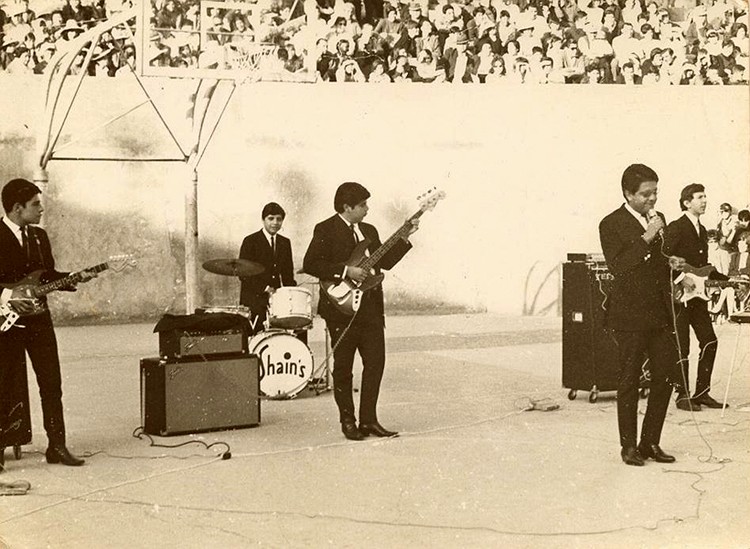Tracklist:
2. Rock And Ball 4-38 (Aguilar)
3. Green Paper (Toilet) 4-06 (Flores, Aguirre)
4. Sitting On My Head 4-41(Aguirre, Aguilar)
5. Deep Death 5-37 (Aguirre, Flores)
6. For Cecilia 4-59 (Aguilar)
7. Pig Pen Boogie 4-27 (Aguirre, Aguilar)
8. Shake Your Ass 1-10 (Aguilar)
Line-up:
Mark Aguilar - lead vocals, bass guitar, piano
Ego Aguirre - lead, rhythm & acoustic guitars,
organ,
backing vocals
Miguel Flores - drums & percussion, backing vocals
Jaime Moreno - lead & backing vocals
String arrangements by Enrique Lynch.
Produced by Pax.
Recorded by Manuel Bellido
at "Radio Studio 1", Lima , Peru
Prologue. According to the CD booklet notes, Pax's only
self-titled album was originally released on the Peruvian "MAG" label
in the middle of 1970.
The Album. First of all I'd like to say you that Mark Aguilar (who
is Peruvian) more than thirty years ago sung in English better that a lot of
contemporary non-English language vocalists, while his voice reminds me Dan
McCafferty's of Nazareth .
Secondly, it is more than hard to believe it, but Pax's only self-titled album,
composed and performed in the first half of 1970, musically can't be compared
to any of the bands that, at the time, were also performing Progressive Hard
Rock (Black Sabbath, Led Zeppelin, Deep Purple, Uriah Heep, Clear Blue Sky,
etc). And you may not believe me (until you check Pax's CD out and listen to
it), but musically, structurally, stylistically (by all means!), the
"Pax" album sounds like a forerunner (the older first cousin from
South America?) of both the most commercially successful (not only, though)
albums of Nazareth ("Rampant", 1974) and Sweet ("Fanny
Adams", 1974). Especially interesting is that the debut albums of both of
these UK
bands were released in 1971! Also, as well as in the case(s) of
"Rampant" and "Fanny Adams" albums, about half of the songs
of "Pax" sound squarely in the vein of traditional Hard Rock of the
1970 (i.e. with heavy, strong, quite diverse and, vigorously, very power riffs
with a few of guitar solos between vocal parts), and another half of them are,
compositionally, fully corresponding to the term of Progressive Hard Rock
(where there are a lot of changes of vocal and instrumental themes, tempos, and
rich instrumental arrangements as well). These are songs from the
"Pax" album that have all the essential compositional ingredients so
as to be named the works of a true Progressive Hard Rock: A Storyless Junkie,
Sitting On My Head, Deep Death, For Cecilia, and Pig Pen Boogie (tracks 1, 4, 5,
6, & 7 respectively). Personally, I am especially impressed with Deep
Death, Sitting On My Head, and For Cecilia, going one after another. The first
of them contains, apart from others, a couple of quite long and, what's the
main, extremely unique (I have never heard anything like this before) dark
episodes with slow yet very tense guitar riffs and gloomy mid-tempo organ
solos. Sitting On My Head is, in my view, the most diverse composition on the
album. In each of the said five songs there are also original and virtuosic
(just wonderful) interplay either between two soloing guitars and bass or
between guitar, bass, and piano solos, going to the accompaniment of the
(always) excellent and diverse drumming. The first part of the song For Cecilia
(track 6) is one of the most wonderful Proto-Prog ballads I have ever heard.
Performed without bass guitar and drums, but still remaining lush and
tastefully orchestrated, it is full of sincere beauty (especially the vocal
sounds). Of course, I was sure that For Cecilia is a (charming) ballad from the
beginning to end (all we are more than used to hearing on albums of Hard Rock
or Hard 'n' Heavy such ballads that sound mellow as a whole, aren't we?). So I
was really amazed when in the middle of the song I heard the wall of heavy
sound with the excellent fast guitar solo on quite a slow, doom-y background
instead of the continuation of the mellowness. Green Paper (track 3) is also
quite rich in interesting arrangements, and although there are also a few of
changes of themes and tempos in this song, it has mixed (electric and acoustic)
structures as a basis. Another track with a mixed stylistics is Rock 'n' Ball
(track 2). In full accordance with the title, there are all refrains sound on
the background of Rock 'n' Roll, while the main themes and instrumental parts
are based on heavy riffs. Each of Green Paper and Rock 'n' Ball contains also a
couple of the fast, incredibly tasteful guitar solos. Finally, Shake Your Ass
is just a short humorous song with a loud laughter in the end.
Summary. Wow! Well, once Mr. Columbus has discovered the
American continent. Is it now really my turn to explore the (hidden, at least
very obscure) roots of South-American Progressive Rock movement (and I have
five CDs more on this point)? Then I have to admit that there was practically
the same situation with Rock music at the Dawn of its (international) movement
on that so distant and exotic mainland. Back to the hero of this review, if the
albums of the five 'heavy' UK bands, that I mention above, really surpass the
Peruvian Pax only album released the same year of 1970, then "Pax",
IMHO, easily surpasses any of the early Grand Funk (1969 - 1972) and Nazareth
albums (1972 - 1973, maybe with the exception of their debut self-titled album
of 1971), as well as both the debut albums of the same Sweet (1971) and
Wishbone Ash (1970). So, "Pax" is highly recommended to all those
into an old 'n' gold Progressive Hard Rock (too, as I myself), at least.
VM. October 26, 2001







No hay comentarios:
Publicar un comentario